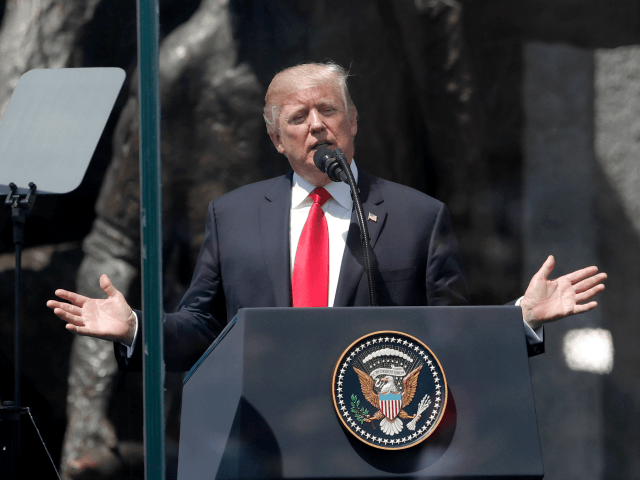Donald Trump outlined “dire threats to our security and to our way of life” in an important speech Thursday in Warsaw, Poland, a nation familiar with “dire threats to our security and to our way of life.”
In the twentieth century, Nazi Germany and Soviet Russia destroyed all but a tiny fraction of the city where the president spoke. But the totalitarians did not break the city’s, or the surrounding nation’s, spirit. As President Trump explained, cries of “We want God!” echoed in the ears of atheist overlords when Pope John Paul II said mass in his homeland almost forty years ago. Today, much of Europe just as loudly shouts “We hate God!”
Christendom once served as a synonym for Europe. St. George’s cross now appears to some Brits as a hate symbol. Much of France in 1996 protested the 1,500th anniversary celebration of the conversion of King Clovis. Can Facebook, Starbucks, and Uber really rally a people the way God can?
The decline of Christianity represents one of the forces that work, in Trump’s words, “to erase the bonds of culture, faith, and tradition that make us who we are. If left unchecked, these forces will undermine our courage, sap our spirit, and weaken our will to defend ourselves and our societies.”
A society not vigorous enough to replace itself represents another subversive force, one only obliquely referenced in Trump’s speech. Earlier this week, the New York Times reported that the U.S. birth rate sunk to its historic nadir in 2016. The fertility rate of the U.S. actually betters Spain, Italy, France, and most other major European nations. Not to worry, the Old Barren Gray Lady explains. “Yes, it’s below replacement level, but not dramatically so,” Brady E. Hamilton of the National Center for Health Statistics assured the Times. “We have a high level of influx of immigrants that compensates for it.”
This high-level of immigration, especially in across the Atlantic, where not predominantly Christian Mexicans eager and able to assimilate but Muslims, many of whom looking to belatedly win the Battle of Tours, flood the continent already has turned parts of Europe into parts of the Middle East. In alleged nation-states on both sides of the ocean, elites view borders as the racism of cartographers.
Multiculturalism represents the fourth challenge softening the West’s will to defend itself. In theory a celebration of many cultures, multiculturalism works in practice as an attack on the dominant culture. Out-of-work quarterback Colin Kaepernick, for instance, asked on the Fourth of July: “How can we truly celebrate independence on a day that intentionally robbed our ancestors of theirs?” The point of such attacks on patriotism in various Western nations essentially posits that the West does not merit a defense.
“The fundamental question of our time is whether the West has the will to survive,” the president posited Thursday. “Do we have the confidence in our values to defend them at any cost? Do we have enough respect for our citizens to protect our borders? Do we have the desire and the courage to preserve our civilization in the face of those who would subvert and destroy it?”
Trump speaks sensible points once made by others on a soapbox now into a megaphone.
“Multiculturalism at home threatens the United States and the West; universalism abroad threatens the West and the world,” the late Samuel Huntington pointed out in The Clash of Civilizations and the Remaking of World Order. “Both deny the uniqueness of Western culture. The global monoculturalists want to make the world like America. The domestic multiculturalists want to make America like the world.”
Five years later, Pat Buchanan noted in 2001’s Death of the West, “As a growing population has long been a mark of healthy nations and rising civilizations, falling populations have been a sign of nations and civilizations in decline. If that holds true, Western civilization, power and wealth aside, is in critical condition.”
A year after that, Roger Scruton pointed out in The West and the Rest, “It is very difficult to contemplate the sacrifice of your life without believing in the durability of the thing for which you die. The patriot who dies in defense of territory and the people who have settled there is not laying down his life for some temporary arrangement, but defending what aims to be permanent.”
As the books by Huntington, Scruton, and Buchanan demonstrate, Donald Trump’s bell-ringing comes as the latest and loudest in a transgenerational sounding of alarms. How long can we keep hitting snooze before we are too late for the task?

COMMENTS
Please let us know if you're having issues with commenting.